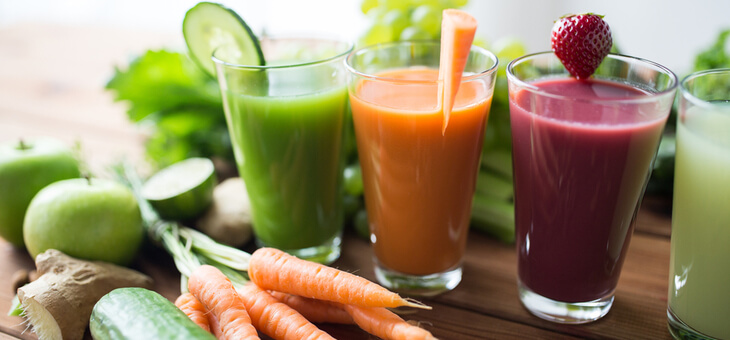Who doesn’t love a refreshing juice to sip on in the summer? They’re often a great way to up your intake of fresh fruits and vegies and an easy way to get a fix of nutrients.
But are they all good for you? The short answer is no, not all juices are created equal. While some are packed with vitamins and nutrients, others are just a hit of sugar disguised as a health drink. Here are the ones to look out for, and those to avoid.
Best choice: vegetable juice
Vegetable juice is a great way to pack in a rainbow of vitamins, minerals and nutrients that your body might not get enough of.
While juice should not be a substitute for a balanced and healthy diet, it does have many of the benefits that come along with eating more fruits and vegetables.
There’s also evidence that certain compounds in fresh juice can function as prebiotics, which feed and support the growth of beneficial bacteria living in your digestive tract.
Read: Juices ranked lower than diet soft drinks
Best choice: 100 per cent fruit juice
Juice that’s made up solely of fruit can give you valuable nutrients such as vitamin C and folate. But on the downside, it doesn’t have the fibre of fresh fruit, it’s calorie-dense and often high in sugars, albeit the naturally occurring variety.
According to the Australian Dietary Guidelines, we should only occasionally consume 100 per cent juice in place of whole fruits to achieve our recommended two serves a day. The guidelines define a serving of juice as 125ml.
Worst choice: fruit drinks
Fruit drinks contain minimal fruit juice (typically around 20 to 35 per cent), water and usually added sugar too.
Fruit drinks can be likened to soft drinks as they are often sweetened with sugar, high in calories but low in nutrients.
They shouldn’t be an everyday indulgence as there’s mounting evidence that drinking sugar-sweetened beverages is associated with an increased risk of weight gain.
Sugary drinks also contribute to dental decay. And drinks that are both sugary and acidic – such as fruit juice, fruit drinks, and fizzy and energy drinks – tend to be the worst offenders.
Best vegie juices to choose
Tomato
While many people consider the tomato to be a vegetable due to its culinary uses, it’s biologically a fruit. Still, many companies classify tomato juice as vegetable juice due to its flavour and low sugar content.
Tomato juice is particularly high in vitamin C, a potent antioxidant that supports iron absorption and promotes skin and immune health.
It’s also a good source of lycopene, a carotenoid and antioxidant that gives tomatoes their red colour.
Lycopene may lower your risk of heart disease and stroke. For example, one review linked increased intake of lycopene to a 13 per cent lower risk of heart disease.
Tomato juice can be very high in salt so look for low-sodium options when possible.
Read: Everything you need to know about flavonoids
Beetroot
Beetroot juice is rich in dietary nitrates and betalains, both of which are associated with a lower risk of heart disease and other chronic diseases.
Beetroot juice may also help lower your blood pressure. Researchers found that people who drank 250 millilitres of beetroot juice daily lowered both systolic and diastolic blood pressure.
Nitrates, the compounds in beet juice that convert into nitric oxide in the blood and help widen and relax blood vessels, are thought to be the cause.
According to a 2011 study, nitrates may also help increase blood flow to the brain in older people and help slow cognitive decline.
Best fruit juices to choose
Pomegranate
Pomegranate juice is rich in vitamin K, which aids blood clotting, heart health, and bone development.
It also provides vitamins A, C and E, iron, and antioxidants such as tannins and anthocyanin.
One study found that pomegranate helped to strengthen bones and prevent osteoporosis in mice through decreased inflammation and oxidative stress.
Another study found that consuming 50ml of pomegranate juice per day reduced damage to arteries and cut cholesterol build-up in people with narrowed arteries.
In fact, pomegranate juice’s antioxidant power seems to be greater than red wine or green tea.
Read: Fruit and vegie skins you really should eat
Cranberry
Drinking unsweetened cranberry juice may also help prevent the build-up of bacteria that cause urinary tract infections. Research on this subject has been mixed but a recent review found that drinking cranberry juice lowered the risk of getting a UTI by 32.5 per cent.
Unsweetened, pure cranberry juice is also a good source of both vitamin C and vitamin E. It also contains several other vitamins and minerals, including copper, vitamin K1 and vitamin B6.
Is it okay to drink fruit juice every day?
Fruit juice can be nutritious, but most types naturally contain a similar amount of sugar and calories to soft drinks.
Most juices don’t have the fibre content of fresh fruit, so a juice drink won’t keep you feeling satisfied and full afterwards.
As with most drinks that contain sugars (even natural sugars), fruit juice should be enjoyed in moderation, as part of a healthy balanced diet.
Do you drink fruit juice? Do you drink it to get a portion of your five a day or just to enjoy the taste? Let us know in the comments section below.
If you enjoy our content, don’t keep it to yourself. Share our free eNews with your friends and encourage them to sign up.
Disclaimer: This article contains general information about health issues and is not advice. For health advice, consult your medical practitioner.

